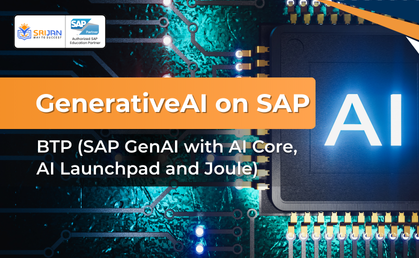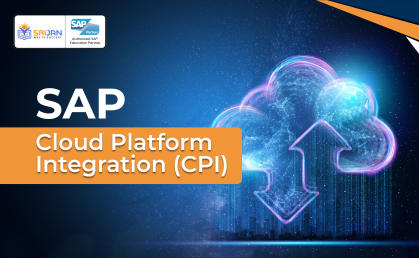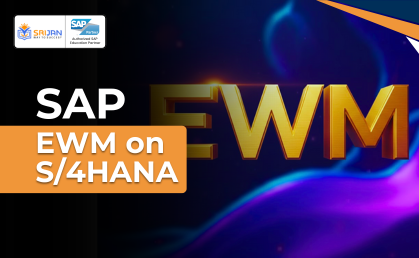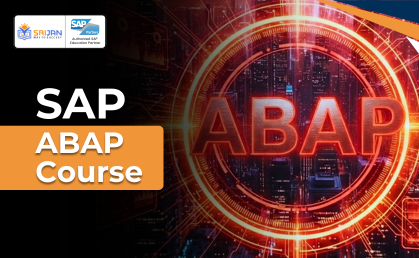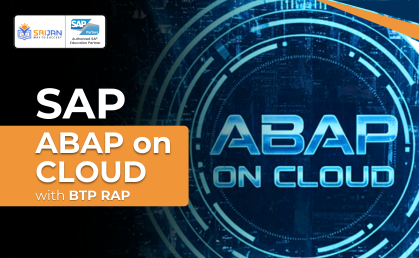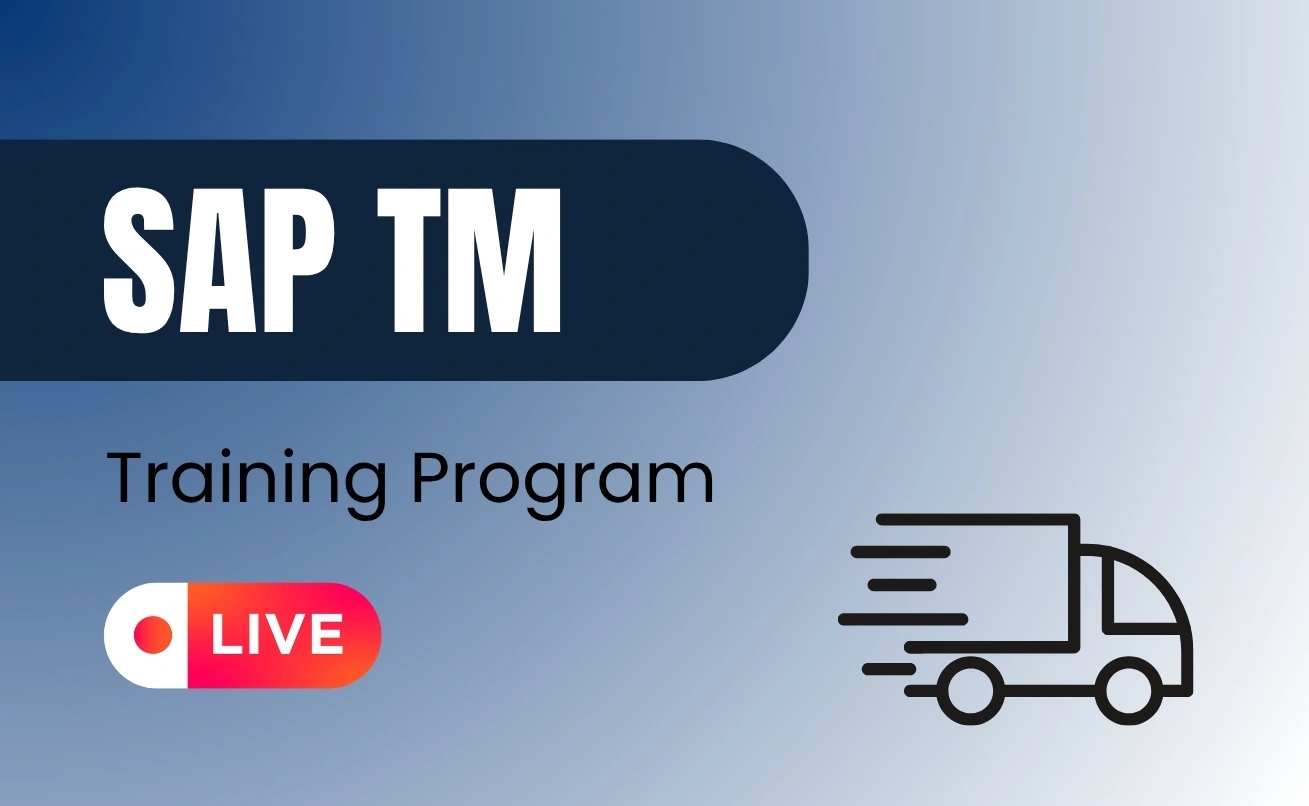SAP TM Course Online
Do you want to be an expert in SAP, take transportation management as your career focus, and get jobs that pay you well in the logistics field?
What is SAP TM and Why You Should Learn It
SAP Transportation Management (TM) is a combination of SAP modules and strategies that helps businesses to reduce the shipping part of the supply chain.
- Reduce transportation costs
- Help in shipment planning and execution by saving time
- Analyze the performance using SAP reporting tools
- Make sure that the supply chain is efficient from source to end customer
Why Choose Srijan Institute for SAP TM Training
Srijan Institute guarantees that your SAP TM course online is not just a gathering of knowledge, rather a change in your professional life:
1. Learn from Certified SAP TM Experts
Our trainers have the experience and knowledge obtained from real-world SAP TM projects. The practical approach, as well as professional secrets, you won’t find in the regular course material.
2. Live Projects and Hands-On Learning
By taking the SAP TM course online with projects, you will be working on real logistics cases such as freight calculation and shipment execution, thus you can be skilled for the complexities of live SAP environments.
3. Updated SAP TM Course Content
Content in our SAP TM course is consistent with the latest S/4HANA updates, and you learn advanced transportation management tools and analytics to remain competitive in the industry.
4. Certification Support and Career Assistance
We provide you with SAP TM certification online help, such as giving exam strategies, conducting mock tests, and resume building.
5. Flexible Online Learning Options
The SAP TM course online with our service offers flexible timings, self-paced learning, and access to the recorded sessions, which means you can learn at your convenience and not miss out on work or studies.
6. Lifelong Learning Resources
Along with Srijan Institute SAP TM online course, you receive continuous updates on the learning materials and access to the recorded sessions for a lifetime so that you can revise your skills anytime.
7. Free Lab Access
Experience the system with a hands-on approach using the free lab access to the live SAP TM system. You can practice the logistics scenarios in real-time and brighten up your practical understanding of the module.
8. Free Resume Template
You will receive a professional, SAP-centric resume template that is designed in a way to exhibit your skills, projects, and certifications in the most effective manner, thus making it easier for you to get noticed while applying for jobs.
9. Free Access to Job Portal & Job Support
Once you have finished your SAP TM certification course online, you will be entitled to free access to Srijan’s job portal and career support that consists of mock interviews, guidance, and placement help.
Career Advantages and Certifications You’ll Get With Srijan Institute’s SAP TM Course Online
Srijan Institute Official Completion Certificate (ISO Certified)
Srijan Institute will award you an ISO-certified certificate after the online SAP TM course completion.
Support for Global SAP TM Certification
Srijan Institute offers you more than just finishing a course. You’ll receive comprehensive guidance and resources for taking the official SAP TM certification online, including practice questions, mock tests, and mentor sessions.
Verified Professional Profile
Moreover, with Srijan Institute certificate of completion as well as your global SAP TM certification, you can create a verified LinkedIn profile that elevates your professional trustworthiness. A large number of recruiters give preference to applicants with verified credentials from the reputed training institutes.
Career-Ready Validation
Such certifications not only prove your knowledge but also portray your capability for SAP TM implementation, consulting, and project management roles. Collectively, they are the ones that distinguish you among the competitive job markets.
Why Trust Srijan Institute Placement Program?
- We have a 100% placement assistance policy
- We have successfully placed more than 5000+ candidates throughout our journey
- Students who complete the 3-month mandatory training program qualify for our placement assistance program
- We have more than 300+ placement partners & internship partners with us
- Real-time training and excellence make Srijan Institute and Training Center the recruiters ' top choice
Conclusion
Srijan Institute’s SAP TM course online is a chance for you to get a hold of SAP Transportation Management and have a happy career in logistics and supply chain.
The fee for SAP TM(Transportation Management) training can vary depending on several factors such as the location, duration of the course, training format, and level of expertise. SAP offers various training options for TM, including instructor-led courses, e-learning courses, and virtual live classrooms.
For More details you can Register
SAP TM(Transportation Management) Certification:
SAP TM (Transportation Management) Certification is a professional credential that validates the knowledge and skills of individuals in SAP TM software. It is awarded by SAP after successfully passing a certification exam. The certification exam tests the candidate's understanding of SAP TM processes, including transportation planning and execution, carrier selection, freight cost management, and supply chain visibility.
There are no formal prerequisites for SAP TM certification, but it is recommended that candidates have a basic understanding of logistics and transportation processes. Additionally, it is recommended to have hands-on experience with SAP TM software and to thoroughly prepare for the certification exam using the official SAP certification study materials.
The SAP TM certification exam consists of 80 multiple-choice questions and has a time limit of 180 minutes. The exam is available in several languages, including English, German, Spanish, French, Russian, Japanese, and Chinese.
SAP TM(Transportation Management) Curriculum:
1. Introduction to SAP TM
Overview of the solution and its benefits
Navigation and user interface
Basic system settings and configuration
2. Master Data Management
Configuration of transportation zones, locations, and partners
Management of carrier contracts and agreements
Creation and maintenance of transportation networks
3. Order Management
Creation and management of transportation orders
Handling of delivery and pickup requests
Management of freight units and tracking of shipments
4. Planning and Optimization
Optimization of routes and carriers based on cost, time, and service levels
Planning of multi-leg and multi-mode transportation
Capacity planning and load optimization
5. Collaboration and Visibility
Collaboration with carriers and logistics service providers
Integration with other SAP modules such as SAP ERP, SAP EWM, and SAP GTS
Tracking and monitoring of shipments and events
6. Analytics and Reporting
Use of SAP TM analytics to monitor KPIs and performance
Creation of custom reports and dashboards
Integration with SAP BusinessObjects for advanced analytics and reporting
7. Advanced Topics
Configuration of complex transportation scenarios such as cross-border and hazardous materials
Management of freight settlement and invoicing
Integration with external transportation management systems
8. Introduction to SAP TM:
Overview of the solution and its benefits
Navigation and user interface
Basic system settings and configuration
9. Master Data Management:
Configuration of transportation zones, locations, and partners
Management of carrier contracts and agreements
Creation and maintenance of transportation networks
10. Order Management:
Creation and management of transportation orders
Handling of delivery and pickup requests
Management of freight units and tracking of shipments
11. Planning and Optimization:
Optimization of routes and carriers based on cost, time, and service levels
Planning of multi-leg and multi-mode transportation
Capacity planning and load optimization
12. Collaboration and Visibility:
Collaboration with carriers and logistics service providers
Integration with other SAP modules such as SAP ERP, SAP EWM, and SAP GTS
Tracking and monitoring of shipments and events
13. Analytics and Reporting:
Use of SAP TM analytics to monitor KPIs and performance
Creation of custom reports and dashboards
SAP TM(Transportation Management) Interview Questions & Answers:
1. What is SAP TM?
A: SAP Transportation Management (SAP TM) is a software platform developed by SAP for managing transportation and logistics processes in a business.
2. What are the key features of SAP TM?
A: Some key features of SAP TM include:
Transportation planning and optimization
Carrier selection and contract management
Shipment execution and monitoring
Freight cost management
Visibility and event management
Analytics and reporting
3. What are the benefits of using SAP TM?
A: Some benefits of using SAP TM include:
Improved visibility and control over transportation and logistics processes
Increased efficiency and productivity
Reduced transportation costs
Enhanced customer service through improved on-time delivery performance
Improved compliance with regulations and standards
4. What is the transportation planning and optimization module in SAP TM?
A: The transportation planning and optimization module in SAP TM enables businesses to create optimal transportation plans by considering various factors such as shipment size, mode of transport, carrier capacity, and delivery deadlines. It helps businesses to identify the most cost-effective and efficient transportation options while ensuring timely delivery.
5. What is the role of carrier selection and contract management in SAP TM?
A: The carrier selection and contract management module in SAP TM allows businesses to manage carrier contracts, rates, and services. It enables businesses to select the most suitable carriers based on their capabilities and pricing, negotiate contracts, and manage carrier performance.
6. What is shipment execution and monitoring in SAP TM?
A: The shipment execution and monitoring module in SAP TM allows businesses to manage the execution of transportation plans, track the status of shipments in real-time, and receive alerts for any deviations or delays. It also enables businesses to communicate with carriers and other stakeholders involved in the transportation process.
7. What is freight cost management in SAP TM?
A: The freight cost management module in SAP TM enables businesses to manage freight costs by automating the calculation of freight charges based on carrier contracts and actual shipment data. It helps businesses to identify cost-saving opportunities and optimize their transportation spend.
8. What is visibility and event management in SAP TM?
A: The visibility and event management module in SAP TM provides real-time visibility into transportation and logistics processes, enabling businesses to track shipments, monitor carrier performance, and receive alerts for any exceptions or delays. It also enables businesses to collaborate with carriers and other stakeholders to resolve issues and improve performance.
9. What is analytics and reporting in SAP TM?
A: The analytics and reporting module in SAP TM provides businesses with comprehensive analytics and reporting capabilities, enabling them to analyze transportation and logistics data, identify trends and patterns, and make data-driven decisions. It also enables businesses to generate reports for various stakeholders and compliance requirements.
10. What are the different deployment options for SAP TM?
A: SAP TM can be deployed on-premises or in the cloud. On-premises deployment involves installing the software on servers owned and managed by the business. Cloud deployment involves hosting the software on a cloud infrastructure managed by a third-party provider.
11. What is the integration capability of SAP TM with other SAP solutions?
A: SAP TM is designed to integrate seamlessly with other SAP solutions such as SAP ERP, SAP S/4HANA, and SAP EWM. Integration with these solutions enables businesses to streamline transportation and logistics processes and achieve end-to-end visibility across the supply chain.
12. What is the role of SAP TM in the freight forwarding industry?
A: SAP TM plays a crucial role in the freight forwarding industry by enabling freight forwarders to manage transportation and logistics processes, collaborate with customers and carriers, and provide value-added services such as customs clearance and warehousing.
13. What are the key challenges in implementing SAP TM?
A: Some key challenges in implementing SAP TM include:
Integration with other SAP solutions and third-party systems
Data quality and completeness
Customization and configuration to meet business-specific requirements
User adoption and change management
Managing the complexity of transportation networks and regulations
14. What are some best practices for implementing SAP TM?
A: Some best practices for implementing SAP TM include:
Defining clear goals and objectives for the implementation
Conducting a thorough analysis of existing transportation and logistics processes
Engaging stakeholders and subject matter experts throughout the implementation process
Prioritizing data quality and completeness
Following industry-standard implementation methodologies and best practices
Providing adequate training and support for users
Continuously monitoring and measuring the success of the implementation
15. What is the difference between SAP TM and SAP EWM?
A: SAP TM is focused on managing transportation and logistics processes, while SAP EWM is focused on managing warehouse operations. However, the two solutions can be integrated to provide end-to-end visibility and control over the supply chain.
16. What is the role of SAP TM in supply chain management?
A: SAP TM plays a crucial role in supply chain management by enabling businesses to manage transportation and logistics processes, optimize their transportation spend, and achieve end-to-end visibility across the supply chain. This helps businesses to improve efficiency, reduce costs, and enhance customer service.
17. What is the transportation network in SAP TM?
A: The transportation network in SAP TM represents the relationships between different locations, carriers, and transportation modes involved in the transportation process. It enables businesses to create optimal transportation plans by considering various factors such as shipment size, mode of transport, carrier capacity, and delivery deadlines.
18. What is the role of SAP TM in managing carrier performance?
A: SAP TM enables businesses to manage carrier performance by tracking carrier performance metrics such as on-time delivery, transit time, and freight cost. It also enables businesses to collaborate with carriers to resolve issues and improve performance.
19. What is the role of analytics in SAP TM?
A: Analytics plays a crucial role in SAP TM by providing businesses with insights into transportation and logistics data, enabling them to identify trends, patterns, and opportunities for improvement. Analytics also enables businesses to generate reports for various stakeholders and compliance requirements.
20. What is the SAP TM cockpit?
A: The SAP TM cockpit is a graphical user interface that provides users with a consolidated view of transportation and logistics processes. It enables users to monitor shipments, track carrier performance, and manage exceptions and delays.
Participants will have 24/7 access to our online lab, providing hands-on experience with SAP TM tools and scenarios.
This includes server access to S/4 HANA 2023 for 1 year, ensuring you have ample time to practice and apply your skills in a real-world environment.
With this extended access, you can work on projects, explore advanced features, and solidify your understanding of SAP TM in the latest SAP S/4 HANA version.
0
Satisfied Students0
Years of Excellence0
Practical TrainingCourse Certification
SAP TM(Transportation Management) Certification:
SAP TM (Transportation Management) Certification is a professional credential that validates the knowledge and skills of individuals in SAP TM software. It is awarded by SAP after successfully passing a certification exam. The certification exam tests the candidate's understanding of SAP TM processes, including transportation planning and execution, carrier selection, freight cost management, and supply chain visibility.
There are no formal prerequisites for SAP TM certification, but it is recommended that candidates have a basic understanding of logistics and transportation processes. Additionally, it is recommended to have hands-on experience with SAP TM software and to thoroughly prepare for the certification exam using the official SAP certification study materials.
The SAP TM certification exam consists of 80 multiple-choice questions and has a time limit of 180 minutes. The exam is available in several languages, including English, German, Spanish, French, Russian, Japanese, and Chinese.
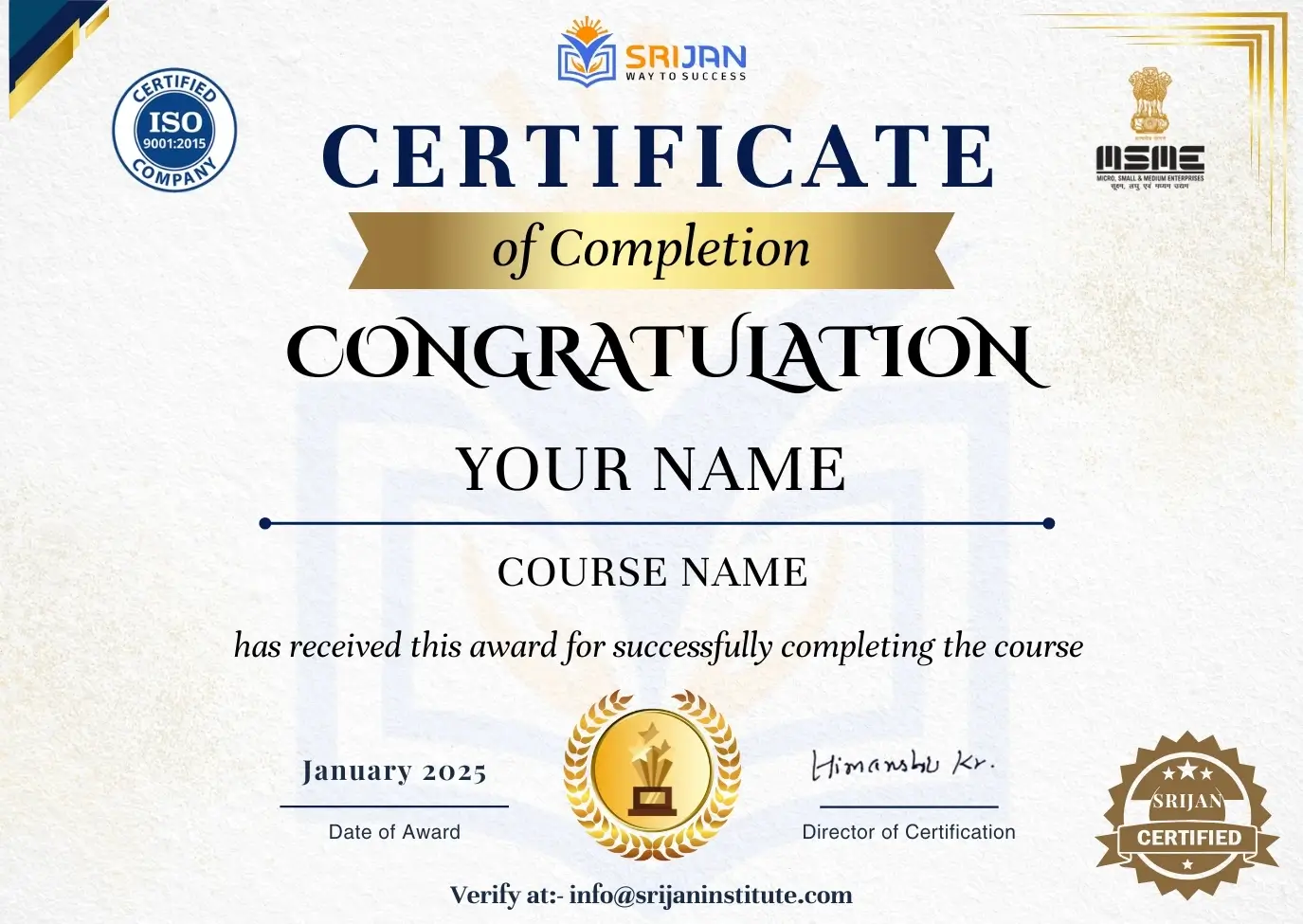
Our Hiring Partners
Our Popular Instructors
Meet our most talented and popular instructors

Mr. Manoj Pandey
SAP| MM| EWM|Ariba|erSAP Global Certified|SAP Consultant
- 12+ Years SAP Experience
- 6K+ Students Trained
- Real-Time Project Training

Mr. Amrit Raj
Full Stack SAP Developer CUM ABAP On HANA Trainer | SAP BTP Developer | Full Stack Developer | ERP & Data Science| SAP Global Certified
- 10+ Years SAP Experience
- 5k+ Students Trained
- Real-Time Project Training

Mr. Sudheer Sharma
SAP| FICO|Trainer|SAP Consultant
- 15+ Years SAP Experience
- 10k+ Students Trained
- Real-Time Project Training

Priyanshu Panday
SAP Basis and Security Consultant
- 4+ Years SAP Experience
- 2.5k+ Students Trained
- Real-Time Project Training

Buddhi Vishwas
SAP HCM | SAP SuccessFactors | Employee Central | RCM | PMGM | SAP Global Certified | SAP Consultant
- 8+ Years SAP Experience
- 3k+ Students Trained
- Real-Time Project Training
Choose Us
Why Choose Our SAP TM Course
-
01
Full Curriculum: Our SAP TM training includes transportation management and logistics execution. The curriculum focuses on industry’s best practices designed to prepare you for supply chain issues in the real world.
-
02
Practical Training: While doing our SAP TM course online, you’ll get the skills to complete case studies and simulations. It means that you can, with your knowledge, immediately start to work with Transport and Logistics operations.
-
03
Qualified Trainer: Our certified SAP trainers break down complex processes in TM into simple lessons. Their leadership will work with you to ensure you pass for certification and career growth.
Choose Your SAP TM Course Learning Plan
Pick the SAP TM Course batch that best fits your schedule—ongoing, upcoming, and recorded options.
On-Going Batch
- First Batch Start Date: 13th January 2026
- Second Batch Start Date: 27th January 2026
($676)
Upcoming Batch
- First Batch Start Date: 10th February 2026
- Second Batch Start Date: 24th February 2026
($676)
Learn At Your Own Pace
-
Enroll to access full recorded sessions, implementation notes, and completion certificate.
Self Paced Courses
Learn anytime, anywhere with our curated recorded courses
SAP TM Course FAQs
Certainly, a completion certificate that is ISO certified from Srijan Institute is issued to you, together with the assistance and prep work for the globally recognized SAP TM certification exam.
Of course. The course starts with basics and then moves to advanced SAP TM topics with live case studies, whether you are a student or a working professional.
Yes, we do offer full assistance. Our job portal, mock interviews, and partnership with 300+ hiring partners are some of the elements through which we provide 100% placement support. Additionally, we also provide you with a 6-month internship.
The duration of the course is approximately three months. The course is available online with a flexible schedule, the possibility of attending a session that has been recorded, and the choice of doing self-paced learning.
The SAP TM module is in great demand all over the world, where the logistics, manufacturing, and supply chain industries are present.
The roles of implementation, consulting, and project management are available at attractive salaries.
Level Up Your Skills with Our SAP TM Course Today!
Unlock Your Career Potential with Our SAP TM Course and Start Learning Today and Gain the Skills Employers Demand!



